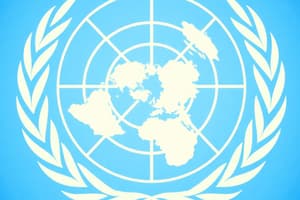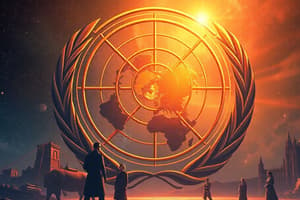Podcast
Questions and Answers
What is the primary role of the General Assembly in the United Nations?
What is the primary role of the General Assembly in the United Nations?
- To provide a forum for discussion on international issues (correct)
- To oversee humanitarian efforts
- To settle international legal disputes
- To maintain international peace
Which principle emphasizes that all member states have equal rights?
Which principle emphasizes that all member states have equal rights?
- Non-Intervention
- Sovereign Equality (correct)
- Collective Security
- Peaceful Settlement of Disputes
Which organ of the United Nations is primarily responsible for maintaining international peace?
Which organ of the United Nations is primarily responsible for maintaining international peace?
- Security Council (correct)
- International Court of Justice
- Economic and Social Council (ECOSOC)
- General Assembly
What type of operations does the United Nations deploy to conflict zones?
What type of operations does the United Nations deploy to conflict zones?
What was the purpose of the Trusteeship Council before it became inactive?
What was the purpose of the Trusteeship Council before it became inactive?
What is required for admission in the General Assembly?
What is required for admission in the General Assembly?
What is one major challenge the UN faces regarding funding?
What is one major challenge the UN faces regarding funding?
Which global issues requires collective action as mentioned?
Which global issues requires collective action as mentioned?
What is the primary focus of the 2030 Agenda for Sustainable Development?
What is the primary focus of the 2030 Agenda for Sustainable Development?
The effectiveness of the UN is largely dependent on which factor?
The effectiveness of the UN is largely dependent on which factor?
Study Notes
Overview
- Established in 1945 after World War II.
- Aims to maintain international peace and security, promote sustainable development, and uphold human rights.
Key Principles
- Sovereign Equality: All member states have equal rights.
- Peaceful Settlement of Disputes: Encourages resolution through negotiation.
- Non-Intervention: States should not intervene in the internal affairs of other nations.
Main Organs
-
General Assembly:
- Deliberates on international issues.
- Each member has one vote.
- Provides a forum for discussion.
-
Security Council:
- Responsible for maintaining international peace.
- Composed of 15 members (5 permanent: USA, UK, France, Russia, China; 10 non-permanent).
- Decisions require a majority, including the concurring votes of all permanent members.
-
International Court of Justice:
- Settles legal disputes between states.
- Provides advisory opinions on legal questions.
-
Secretariat:
- Oversees day-to-day operations.
- Led by the Secretary-General.
-
Economic and Social Council (ECOSOC):
- Coordinates economic, social, and related work.
- Promotes international economic and social cooperation.
-
Trusteeship Council (inactive since 1994):
- Established to oversee territories transitioning to self-government.
Specialized Agencies
- Includes organizations like WHO (World Health Organization), UNESCO (United Nations Educational, Scientific and Cultural Organization), and UNICEF (United Nations Children's Fund).
- Operates independently but coordinates with the UN.
Functions
- Peacekeeping Operations: Deploys peacekeeping forces to conflict zones.
- Humanitarian Assistance: Provides aid and support in crises.
- Development Programs: Promotes sustainable development initiatives and poverty alleviation.
- Human Rights Advocacy: Monitors and promotes the protection of human rights through various treaties and mechanisms.
Membership
- Composed of 193 member states.
- Admission requires a two-thirds majority vote in the General Assembly.
Challenges
- Political Conflicts: Diverging interests among member states can hinder decision-making.
- Funding: Reliance on member states for financial contributions.
- Global Issues: Addressing complex issues like climate change, terrorism, and pandemics requires collective action.
Current Initiatives
- Focus on the 2030 Agenda for Sustainable Development, aiming for inclusive growth and environmental sustainability.
- Promoting peace and security through various resolutions and peacekeeping missions globally.
Conclusion
- The UN plays a crucial role in international affairs, fostering cooperation among nations to tackle global challenges. Its effectiveness depends on member states' commitment to collaboration and respect for international law.
Overview
- Established in 1945 post-World War II to ensure international peace and security.
- Focus areas include sustainable development and the promotion of human rights.
Key Principles
- Sovereign Equality: Every member state possesses equal rights.
- Peaceful Settlement of Disputes: Encouragement of negotiation as the primary conflict resolution method.
- Non-Intervention: Prohibition of involvement in the internal matters of other nations.
Main Organs
- General Assembly:
- Provides a platform for international discussion.
- Each member state has one vote, allowing for equal representation.
- Security Council:
- Responsible for peace maintenance globally.
- Consists of 15 members: 5 permanent (USA, UK, France, Russia, China) and 10 non-permanent.
- Decisions require a majority, including agreement from all permanent members.
- International Court of Justice:
- Resolves legal disputes between states and offers advisory opinions on legal matters.
- Secretariat:
- Manages daily operations and administration of the UN.
- Led by the Secretary-General.
- Economic and Social Council (ECOSOC):
- Coordinates economic and social efforts among member states.
- Promotes global economic and social cooperation.
- Trusteeship Council (inactive since 1994):
- Originally created to oversee territories moving towards self-governance.
Specialized Agencies
- Includes agencies like WHO, UNESCO, and UNICEF.
- Operate independently while maintaining coordination with the UN for greater impact.
Functions
- Peacekeeping Operations: Deployment of forces to stabilize conflict regions.
- Humanitarian Assistance: Provision of vital aid and support during crises.
- Development Programs: Initiatives aimed at promoting sustainable development and reducing poverty.
- Human Rights Advocacy: Monitoring and advocating for human rights through treaties and mechanisms.
Membership
- Comprises 193 member states.
- New member admission requires a two-thirds majority vote in the General Assembly.
Challenges
- Political Conflicts: Disagreements among member states can obstruct effective decision-making.
- Funding: Financial limitations due to reliance on member state contributions.
- Global Issues: Tackling intricate global problems such as climate change, terrorism, and pandemics necessitates unified action.
Current Initiatives
- Emphasis on the 2030 Agenda for Sustainable Development, aiming for inclusive growth and environmental sustainability.
- Ongoing efforts in promoting peace and security through various resolutions and global peacekeeping missions.
Conclusion
- The UN is pivotal in shaping international relations and fostering cooperation to address global issues.
- Its effectiveness is greatly influenced by the commitment of member states to work together and respect international laws.
Studying That Suits You
Use AI to generate personalized quizzes and flashcards to suit your learning preferences.
Description
This quiz examines the establishment, key principles, and main organs of the United Nations, established in 1945. It covers topics such as sovereign equality, peaceful dispute resolution, and the various organs including the General Assembly and Security Council. Test your knowledge on how the UN promotes international peace, security, and human rights.



